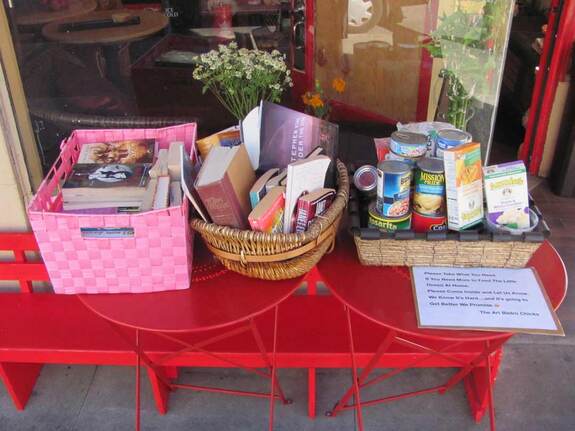IN THIS ISSUE |
Social Distancing in Golden Gate Park - Jane Hudson
FOCUSAN EDITORIAL NOTE
Hazardous air quality has kept me inside for days. Stir-crazy, I venture onto the patio.
An orange sky. I’ve never seen this before. Has a Malevolent Deity taken hold of the entire World, having already seeded the Earth with a death-dealing virus, now unleashing devastating wildfires devouring land and destroying lives, piled on top of the racial strife of the broken cities? I try to muddle through this Covid Era. I vaguely remember when it began, cannot see the end. You may be assured that this seventy-year-old man cannot discern the shape of things to come, the so-called “new normal.” Nor do I know how to rekindle the life before. Time has come to a stop. “Sheltering in place,” part of the growing lexicon that defines (and confines) us, is made almost “easy” today by the unbreathable air that constricts the lungs. Wheezing slightly, eyes hurting, repeatedly clearing my throat, I retreat back inside, seal the sliding door, and turn on the AC. I’m well into the fifth season of 30 Rock, a show that gets me to smile, even chuckle out loud. Hunting for new diversions, I add a 50th channel, Kanopy, to my new Roku device. This one includes the prestigious Criterion Collection. Home entertainment expands as my life contracts. So far my insulin and medical supplies have continued to arrive by mail (though it appears that the centuries-old USPS is yet another venerable institution that is being dismantled). Should I decide, like some of my sheltering friends, to have all my food delivered, perhaps I need never step out into the world again. Welcome virtual life! Living alone, I sometimes lose track of the days. Today is Wednesday, I think, or perhaps Tuesday. Our new lexicon calls this hazy mental state “Blursday.” Of course, I get the days straightened out for the occasional Zoom or Skype meeting—the new parameters of what, in pre-Covid times, I believe, was called “social life.” We’ll need to find a replacement for that quaint phrase in the new language of our virtual lives. But will we be able to heal our damaged souls from the continual suppression of normal social instincts? And what is the right language for the death of a loved one uncomforted by a whispered endearment or tender caress? What does the new jargon have to say about such a death? “A Properly Socially-Distanced Farewell?” As I compose these words in mid-September, I look toward the upcoming election. I cannot fathom why the old, tiresome and contentious trope of Left versus Right persists into the Covid Era. I am tired of these repetitious, time-worn and raging voices—too much noise, too little signal. All that matters now is choosing Right over Wrong, a solitary act of conscience beyond the too-easy, empty and spent dogmas of ideology. I wonder why intelligent people cannot see that our brief, tenuous experiment in Democracy, surely the worst form of governance imaginable, except that every other conceivable alternative is worse, may be coming to an end. “Oh, yes, we quite agree with you there,” answers an uninvited voice in my head. “If our guy doesn’t win, the Socialists and Commies and Anarchists will destroy the American Way of Life!” “No, you don’t understand me at all,” I reply to the voice of Authoritarian Populism. Astonished that their cult leader said the words out loud, I repeat them to myself, “There won’t be a peaceful transfer of power. There will be a continuation.” How much farther down this road must we travel? Or has the third world dictatorship already arrived? In frustration, I turn away from the hollow voices of the pundits, away from the no-longer-relevant Left versus Right. And I reject every last word and catchphrase of the new lexicon, which, unaccountably, already seems centuries old and worn out, in order to find a different path, or any path at all. Wearily, I turn instead to the poets who may help forge a language adequate to our broken world. In his oft-quoted poem, “The Second Coming,” Yeats describes a time when Things fall apart; the centre cannot hold;
Mere anarchy is loosed upon the world, The blood-dimmed tide is loosed, and everywhere The ceremony of innocence is drowned; The best lack all conviction, while the worst Are full of passionate intensity. In a less well-known poem, “Natural Music,” Robinson Jeffers invites us to discover a deeper harmony in the midst of the world’s strife.
So I believe if we were strong enough to listen without
Divisions of desire and terror To the storm of the sick nations, the rage of the Hunger-smitten cities, Those voices also would be found Clean as a child’s; or like some girl’s breathing Who dances alone By the ocean-shore, dreaming of lovers.
I listen for the Natural Music beyond the imperious voices of the Righteous, the swirl of chaos and destruction in the cities, the polluted air, the mounting dead and survivor sorrow, and dream, forlornly, of better times.
* * *
In this tenth issue of Vistas & Byways, OLLI at SF State’s online literary review, we offer 19 contributions on our special theme, the Pandemic. I urge you to use the thumbnail descriptions in the Table of Contents as a guide to the varied responses to our theme across all literary genres. There you will find a crab’s-eye-view of the virus in Barbara Applegate’s charming story, “The World Above.” In her brief memoir, “Life in the Time of Covid,” Cathy Fiorello wonders whether, at the end of the 8th decade of her life, the predatory virus “will pass out of this life before I do.” Thomas O. Davenport offers a bit of wry humor in his poem, “Delayed Replay,” where he’s stuck in the purgatory of watching sports events “I’ve already seen.” In her unusual short story, “A Tired and Lazy God,” Charlene Anderson offers a sharp contrast to my speculations about a Malevolent Deity ruling over the Covid Era. She imagines a world in which the Covid Virus has unaccountably disappeared, only to be replaced by never-ending torrential rains across the entire globe. A group of eight scientific experts convene for a conference in Geneva to see if they can discover the cause of the latest catastrophe. It appears that God may have withdrawn from the world, leaving human beings on their own to figure out how to overcome the inexplicable downpour. Please don’t neglect the many fine non-Covid contributions in this issue. You will find much to enjoy, for example, in the short stories of past contributors Matt Ginsburg, Denize Springer and Linda Zamora Lucero, each story a well-crafted reminder of themes that transcend the Covid Era. Inside OLLI offers a tribute to the late Richard Simmonds; Elsa Fernandez’s book review of Dreams and Blessings—Six Visionary Poets, focusing on the poems of Angie Minkin; Dina Martin’s interviews with OLLI members (“Zooming Boomers”); and Mike Lambert’s interview with Helena Chiu, assistant to SF State at OLLI’s Director, Kathy Bruin. Our special photographic theme is Bay Area Neighborhoods, which includes eight photo essays. We’re pleased to welcome the following new contributors: Jill Stovall, Robin Roth, Nancy Colvin, Edward Lebowitz, and Karen Thompson. In these unprecedented times, I believe that Vistas & Byways has a special role to play in helping OLLI at SF State members to stay connected with each other. No matter how many OLLI courses you take, virtual or otherwise, there’s no better place to discover the rich imaginative lives of fellow OLLI members than in our online magazine. The submission window for our eleventh issue will be the month of February 2021. The Editorial Board has no particular desire to offer “Pandemic—Part 2” as our special theme. In any case, our theme is yet to be determined. Don Plansky, Member - Editorial Board September, 2020 FEATURED WRITING TOPIC:
|
FOCUS
|



